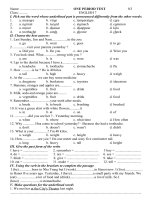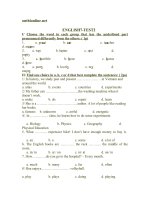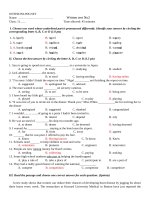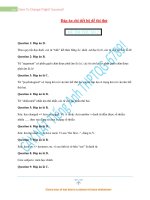ĐỀ THỰC CHIẾN số 15 tiếng anh
Bạn đang xem bản rút gọn của tài liệu. Xem và tải ngay bản đầy đủ của tài liệu tại đây (508.79 KB, 7 trang )
KHÓA THỰC CHIẾN 50 – ĐỀ THỰC CHIẾN SỐ 15 – ÔN ĐÚNG - TRÚNG
Mark the letter A, B, C, or D on your answer sheet to indicate the word whose underlined part differs from
that of the other three in pronunciation in each of the following questions.
Question 1: A. mended
B. objected
C. waited
D. reached
Question 2: A. nice
B. rise
C. light
D. gift
Mark the letter A, B, C, or D on your answer sheet to indicate the word that differs from the other three in
the position of primary stress in each of the following questions.
Question 3: A. accept
B. support
C. window
D. employ
Question 4: A. embarrass
B. introduce
C. defining
D. encourage
Mark the letter A, B, C, or D on your answer sheet to indicate the correct answer to each of the following
questions.
Question 5. Since we came here, we _______ a lot of acquaintances.
A. have had
B. had
C. have
D. are having
Question 6. _______ to the party, we could hardly refuse to go.
A. Having invited
B. To have invited
C. Having been invited
D. To have been invited
Question 7. You'll be home before midnight, _______ ?
A. will you
B. won't you
C. are you
D. aren't you
Question 8. Our basketball team successfully _______ the championship.
A. protected
B. held
C. assured
D. defended
Question 9. Economic growth is an increase in the _______ of economic goods and services, compared from
one period of time to another.
A. produce
B. productive
C. production
D. productively
Question 10. _______ the apartment is, the cheaper the rent is.
A. The smaller
B. Smaller
C. Smallest
D. The smallest
Question 11. More than 120,000 people _______ by the two atomic bombs in Hiroshima and Nagasaki in
August 1945.
A. were killing
B. were killed
C. killed
D. kill
Question 12. I have the greatest respect for his ideas _______ I don't agree with them.
A. although
B. because of
C. in spite of
D. because
Question 13. Maintaining biodiversity is important _______ us in many ways.
A. for
B. about
C. with
D. of
Question 14. I will send you the report _______.
A. until I received it
B. after I had received it
C. the moment I receive it
D. when I received it
Question 15. As Linda’s alarm clock did not _______, she arrived at the airport late.
A. turn off
B. put off
C. send off
D. go off
Question 16. Many Asians are treated like second-class citizens, which makes them feel like a _______ out of
water.
A. shark
B. fish
C. prawn
D. shrimp
Question 17. Anna was attracted by the young man driving a _______ car.
A. racing modern Japanese
B. modern Japanese racing
C. modern racing Japanese
D. Japanese modern racing
Question 18. Daley forgot that few natives choose to _______ a Ph.D. degree, while many from Asian
countries do so.
A. pursue
B. admire
C. chase
D. desire
Question 19. The athlete failed in his last _______ to break the world record.
A. trial
B. attempt
C. effort
D. experience
Mark the letter A, B, C, or D on your answer sheet to indicate the word(s) CLOSEST in meaning to the
underlined word(s) in each of the following questions.
Question 20: Recognised as a World Heritage Site in 1983, the Taj Mahal Complex, including the tomb,
mosque, guest house, and main gate, has preserved the original qualities of the buildings.
A. initial
B. ancient
C. unique
D. perfect
Question 21: It's a common practice to look at the person you are talking to.
A. exercise
B. policy
C. skill
D. habit
Mark the letter A, B, C, or D on your answer sheet to indicate the word(s) OPPOSITE in meaning to the
underlined word(s) in each of the following questions.
Question 22: He was sentenced to prison because he was involved in illicit drug trade.
A. legal
B. lawless
C. moral
D. supported
Question 23: Joe didn’t bat an eyelid when she was informed that she had failed the competition.
A. was deeply disappointed
B. was very excited
2
C. was extremely angry
D. was so surprised
Mark the letter A, B, C, or D on your answer sheet to indicate the most suitable response to complete each
of the following exchanges.
Question 24: David: “How long does it take to get to the post office from here?” - Tom: “_______”
A. There’s a bus every fifteen minutes.
B. I’m driving to the post office this afternoon.
C. No more than thirty minutes, if the traffic is light.
D. It costs fifteen cents by car.
Question 25: Tim: “I think requiring students to wear school uniforms is necessary.”
David: “ _______. A school uniform spares students from worrying about not having the latest fashions.”
A. It’s my pleasure
B. I can’t agree with you more
C. I don’t agree
D. I don’t like wearing uniforms
Read the following passage and mark the letter A, B, C, or D on your answer sheet to indicate the correct
word or phrase that best fits each of the numbered blanks from 26 to 30.
The outbreak of COVID-19 is an unprecedented public health crisis, touching nearly all countries and (26)
_______ across the world. The health impacts of COVID-19 are devastating and, rightly, in the forefront of
our minds, across our media, and impacting people's lives and livelihoods across the world.
One of the most tangible outcomes of COVID-19 is the ever-increasing socio-economic gap between
learners. Over 365 million children are missing out on important school feeding programs (27) _______ keep
them healthy and motivated to learn. Moreover, families may be pushed to (28) _______ to negative coping
mechanisms to meet their needs, including child labor or reducing the number and quality of meals at a time
when staying healthy and keeping a strong immune system is particularly important.
Home learning may itself be a source of stress for families and learners, with pressure to take on new
responsibilities. Many children are suffering from anxiety, living without access to the internet or other means
required to benefit from distance learning. (29) _______ older children are stressed about missing months of
education (30) _______ they have to care for younger children in the home while parents and caregivers are
working.
(Adapted from />Question 26: A. communities
B. contexts
C. basics
D. backgrounds
Question 27: A. who
B. when
C. which
D. why
Question 28: A. mitigate
B. resort
C. offer
D. worry
Question 29: A. Some
B. Others
C. Much
D. Every
Question 30: A. although
B. as
C. therefore
D. however
3
Read the following passage and mark the letter A, B, C, or D on your answer sheet to indicate the correct
answer to each of the questions from 31 to 35.
In a recent interview with Quartz, an online publication, Bill Gates expressed skepticism about society's
ability to manage rapid automation. To prevent a social crisis, he mused, governments should consider a tax
on robots; if automation slows as a result, so much the better. It is an intriguing if an impracticable idea, which
reveals a lot about the challenge of automation. Mr. Gates argues that today's robots should be taxed either for
their installation, or the profits firms enjoy by saving on the costs of the human labor displaced. The money
generated could be used to retrain workers, and perhaps to finance an expansion of health care and education,
which provide lots of hard-to-automate jobs in teaching or caring for the old and sick.
Mr. Gates seems to suggest that investment in robots is a little like investing in a coal-fired generator: it
boosts economic output but also imposes a social cost, what economists call a negative externality. Perhaps
rapid automation threatens to remove workers from old jobs faster than new sectors can absorb them. That
could lead to socially costly long-term unemployment, and potentially to support for destructive government
policy. A tax on robots that reduced those costs might well be worth implementing, just as a tax on harmful
blast-furnace emissions can discourage pollution and leave society better off. The reality, however, is more
complex. Investments in robots can make human workers more productive rather than expendable; taxing them
could leave the employees affected worse off. Particular workers may suffer by being displaced by robots, but
workers as a whole might be better off because prices fall. Slowing the use of robots in health care and herding
humans into such jobs might look like a useful way to maintain social stability. But if it means that healthcare
costs grow rapidly, gobbling up the gains in workers' income.
(Adapted from />Question 31: What could be the best title for the passage?
A. Bill Gates' proposal for taxing robots
B. Bill Gates' opposition to taxing robots
C. Bill Gates' opinion on automation
D. Bill Gates' support for automation
Question 32: The word “it” in paragraph 2 refers to _______.
A. robot
B. investment
C. generator
D. cost
Question 33: The word “displaced” in paragraph 2 is closest in meaning to _______.
A. changed
B. located
C. replaced
D. exchanged
Question 34: According to the passage, which of the following is NOT TRUE about Gates' idea of taxing
robots?
A. A tax on robots might have a negative impact on competitiveness and innovation.
B. Considering a tax on robots may help the government to prevent a social crisis.
C. A tax on robots can be used to retrain displaced workers.
D. A tax on robots that replace human labor is a way to slow down the spread of automation.
Question 35: Employees, in general, may benefit from the taxation on robots because _______.
A. they get more opportunities
B. investment in robots increases
4
C. there is a drop in prices
D. the productivity improves
Read the following passage and mark the letter A, B, C, or D on your answer sheet to indicate the correct
answer to each of the questions from 36 to 42.
The Covid-19 pandemic has reshaped our personal relationships in unprecedented ways, forcing us to live
closer together with some people and further apart from others. Both in China, which was the first country in
the world to go into full lockdown when the virus emerged there and in Hong Kong – the virus has been brought
under control and life has returned to some semblance of normality. But the pandemic has left some cracks in
family relationships.
Most notably the high-pressure environment of confinement, combined with the financial stress brought
about by a Covid-19 burdened economy, has led to a rise in marital conflict. This is most evident in a spike in
divorce rates. In the city of Xi’an in northwest China’s Shanxi province, marriage registration offices saw an
unprecedented number of divorce requests when they re-opened in March. And it would seem that in more
extreme cases, these conflicts arising during lockdown have led to a surge in cases of domestic violence. In
Hubei province, the heart of the initial outbreak reported cases of domestic violence increased threefold since
the pandemic started.
In Beijing, the women’s rights NGO Equality reported a surge in calls to its helpline on issues of domestic
violence, after lockdown measures were implemented throughout the country in early February. In Hong
Kong, Harmony House, a domestic violence prevention center and shelter, the number of admissions to the
center rose from 10 in January to 40 in April. Although Hong Kong hasn’t gone into full lockdown, pandemic
stress, the pressures of working from home, school closures, and social isolation…have caused a rise in abusive
behaviors in families.
Another challenge that families are facing is the increased burden of care as a result of quarantine measures
and home-schooling situations. Often, women end up shouldering a greater burden, given typically unequal
divisions in household labor, according to Choi. Women spend 2.5 times more time on unpaid care work than
men in China, and this will have long-term implications on women’s ability to participate in the workforce.
“Women workers might be disproportionately affected by Covid-19-related layoffs,” said Choi, both because
women have to stay at home and take care of their families, but also because both in China and Hong Kong,
women are more likely to be employed in the retail sector, including restaurants, hotels, and airlines, which
have been hit heaviest by the pandemic.
(Adapted from />Question 36: Which best serves as the title for the passage?
A. Family Ties and Pandemics: Red Alert Worths Noticing
B. Social Distancing and Stigma: Are We Flexible Enough?
C. New Normal for Families after Full Lockdown
D. Family Communication in the COVID-19 Pandemic
Question 37: The word “confinement” in paragraph 1 is CLOSEST in meaning to _______.
A. quarantine
B. freedom
C. ease
5
D. boundary
Question 38: In paragraph 2, the divorce rate is on the rise due to _______.
A. the lockdown and financial burden
B. misunderstanding between the couples
C. lack of ability to resolve conflicts
D. space limitation when being isolated
Question 39: The word “implemented” in paragraph 3 is CLOSEST in meaning to _______.
A. imposed
B. rejected
C. absorbed
D. investigated
Question 40: The word “their” in paragraph 4 refers to _______
A. men’s
B. women’s
C. workers’
D. divisions’
Question 41: Which of the following is NOT mentioned, according to the passage?
A. The Coronavirus pandemic has restructured our own connections remarkably.
B. After making efforts to reduce domestic violence, the government eventually made a go of it.
C. In China, women carry more burden than men due to inequitable divisions in family work.
D. China is considered to be the first country to impose full quarantine on its own country.
Question 42: Which of the following can be inferred from the passage?
A. Without monetary weight brought about by the pandemic, couples wouldn't break up.
B. China is considered to be the country affected most adversely by the pandemic.
C. The pandemic exerts a disastrous impact on the relationship among family members.
D. The Covid-19 pandemic is the root of domestic conflicts which never have existed before.
Mark the letter A, B, C, or D on your answer sheet to indicate the underlined part that needs correction in
each of the following questions.
Question 43: The last time I was going swimming was when I was in Nha Trang.
A. The last time
B. was going
C. was
D. I was
Question 44: Sharks can detect minute electrical discharges coming from its preys.
A. can detect
B. electrical
C. coming
D. its
Question 45: The expert says progress and economical development depend on educating children.
A. says
B. economical
C. depend
D. educating
Mark the letter A, B, C, or D on your answer sheet to indicate the sentence that is closest in meaning to each
of the following questions
Question 46: It isn't necessary for us to prepare a present for him.
A. We needn't prepare a present for him.
B. We can't prepare a present for him.
C. We shouldn't prepare a present for him.
D. We may not prepare a present for him.
Question 47: They have owned this car for three and a half years.
6
A. They bought this car three and a half years ago.
B. They was buying this car for three and a half years.
C. This car belonged to them for three a half years.
D. They have bought this car for three and a half years.
Question 48: “I am sorry mum, I slipped and broke the glass” the boy said.
A. The boy apologized to his mum for breaking the glass.
B. The boy denied having broken the glass.
C. The boy told his mum to break the glass.
D. The boy refused to have broken the glass.
Mark the letter A, B, C, or D on your answer sheet to indicate the sentence that best combines each pair o f
sentences in the following questions
Question 49: He was not an expert on computer technology. Therefore, he did not invest in any computer
companies.
A. Provided he were an expert on computer technology, he would invest in some computer companies.
B. He wishes he was investing in some computer companies now.
C. Had he been an expert on computer technology, he would invest in some computer companies now.
D. If he had been an expert on computer technology, he would have invested in some computer companies.
Question 50: TV news programs are informative. People are better informed now.
A. Had it not been for TV news programs, people wouldn’t have been better informed.
B. Never have people been so well informed as they are now, thanks to TV news programs.
C. Not until people had been well informed was TV news programs more informative.
D. No sooner had TV news programs been informative than people were better informed.
7









